For most parents, a healthy baby is all they hope for out of pregnancy. You just want your baby to be alive and happy and safe — and because worrying is what moms do best, there are always worst-case scenarios playing through your mind. Still, no one ever thinks they’ll be the one to experience the horror of actually hearing bad news from their doctor. Yet for one First Coast family, that’s exactly what happened… and it was nothing they ever expected.
Joseph and Jamie Ball were thrilled to be expecting their first baby. “Being our first pregnancy, we wanted to do all the fun pregnancy things!” Jamie recalled. So when their doctor gave them the chance to pay for an extra 4D ultrasound at 28 weeks, they took it. But things did not go as expected. “The sonographer noticed Lillian’s kidneys looked large, bright in color and my amniotic fluid was very low,” Jamie explained. “They sent us to a specialist the following week.”
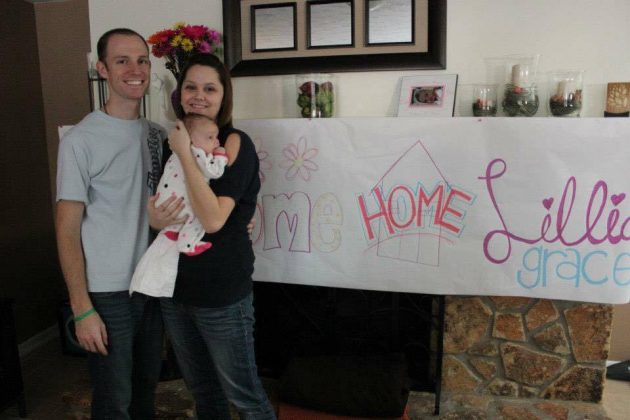
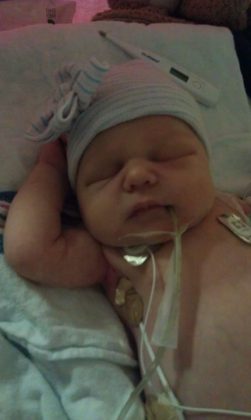
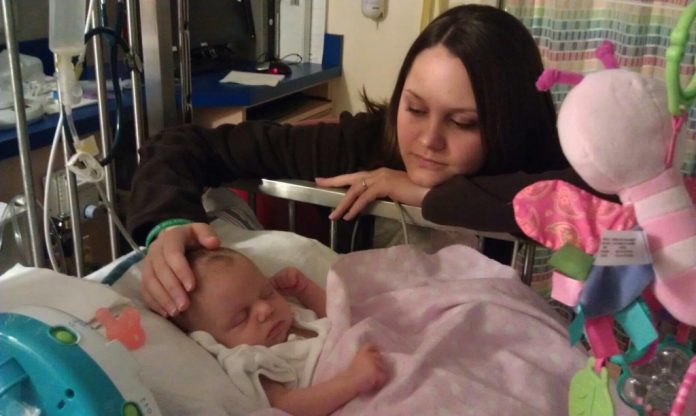
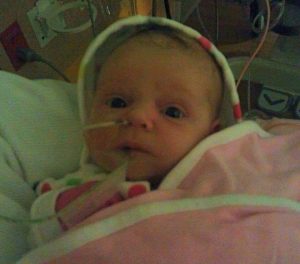
What happened at that appointment Jamie calls one of the worst experiences of her life. “We went to a high-risk doctor, and after a very long ultrasound, he came in, and within two minutes, told us he suspected our unborn daughter had Autosomal Recessive Polycystic Kidney Disease,” she said. “He was so frank, so bold and cold. He told us in the state of Florida, I was past the legal time for abortion, and that the chances of our daughter’s survival were ‘slim.’ They literally walked us to an office, handed us a box of tissues and some literature they just printed, and suggested if we hadn’t already had one, to suggest to family that a baby shower was unnecessary. We felt broken.”
Autosomal Recessive Polycystic Kidney Disease, or ARPKD, had not even been on their radar. ARPKD is a rare genetic disorder that affects approximately one in 20,000 people. While the prognosis for children born with ARPKD has improved dramatically, the disease can be fatal — especially in the first month. But Jamie refused to lose hope. “As a first-time mother, I was terrified,” she admitted. “I had no idea if my daughter was going to even be able to take her first breath. Everything I searched, everything I read from a scientific stand point, was negative. But I had undeniable faith that she was going to be okay, that she was going to fight.”
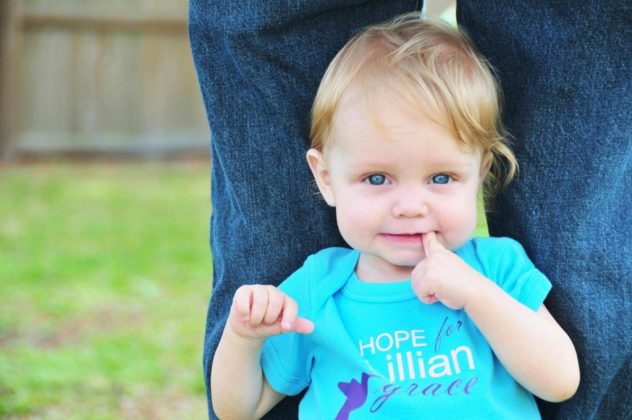
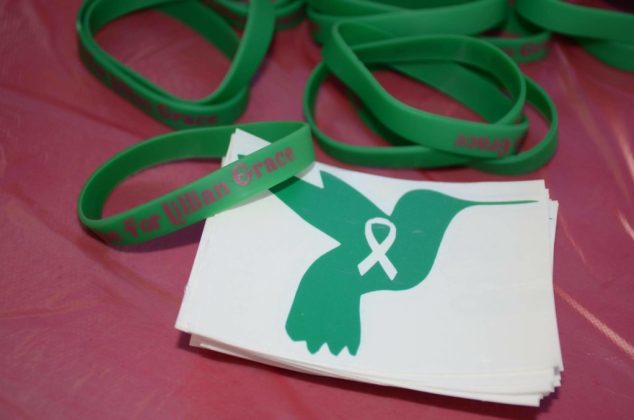
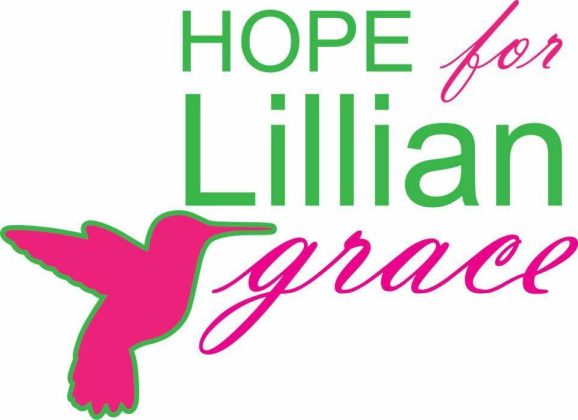

And she was right. Two days before her scheduled c-section, Jamie went into labor. “I remember the anesthesiologist saying to Joe, ‘Get ready with your camera, Dad, you’re only going to have a second before they take her to NICU’,” she said. “And within seconds, I heard the most beautiful noise that I had prayed for months to hear: the softest little cry from a beautiful 7-pound baby that was the purest sound of hope I had ever heard. It was an ‘I’m gonna fight, Mom.'”
Initially, things did not look good for their daughter, who they named Lillian. “Her kidneys grew at an alarming rate her first week of life,” Jamie explained. “We initially thought we were going to need to remove one kidney to allow room for her other organs, but things slowed down after that first week, which prevented the surgery.” Doctors thought she would need to have a kidney transplant around her first birthday, so the goal was for her to gain 20 pounds in that first year.
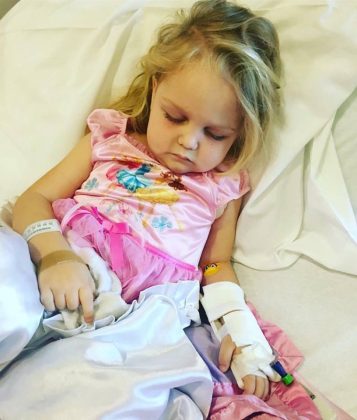
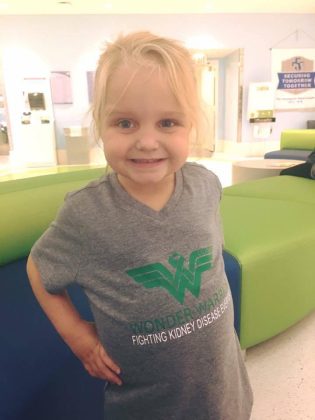
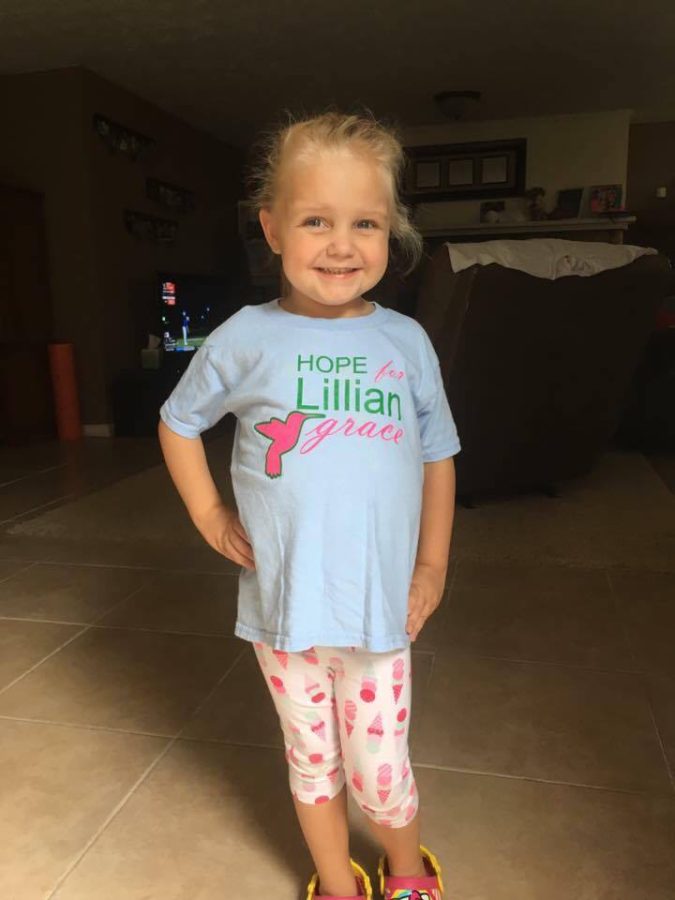
And while Lillian made it to her first year, that in and of itself was a huge battle to win, and it didn’t come easily. “Most babies born with ARPKD don’t live past their first month, let alone their first birthday,” Jamie said. “Thirty to 50% of children born with ARPKD pass away during infancy.” Yet Lillian’s kidney function and size remained stable. She grew at a normal rate, was able to come off of her feeding tube, took bottles, and ate baby food. She ultimately spent 50 days in the NICU, but before she left, she stopped needing therapies from the NICU staff. “Every birthday we make a grand celebration because it’s another victory, another year she’s surpassed what doctors expected of her,” Jamie said.
Still, while Lillian has done incredibly well, the prospect of a kidney transplant was still inevitable. “One-third of children with ARPKD are either on dialysis or have a transplant before the age of 10,” Jamie explained. While they were lucky to escape needing a transplant in her first year, it’s become an unescapable reality, as Lillian’s health has increasingly worsened over the past year. “Lillian has had three hospital stays, ranging from seven to 10 days each time, has spent three days in the ICU, had four kidney infections, countless IVs, three ultrasounds… the list goes on,” Jamie said. “From September 2016 to December 2016, we had made eight ER visits. Last fall, Lillian’s blood pressure got so high, she was at risk for stroke. I remember her doctor looking at us and telling us how lucky we were. This last hospital stay in March was the hardest. She was in for a severe kidney infection, and while admitted caught a virus. Her IVs kept failing and blowing. In seven days, Lillian had 18 IVs. We met with Child Life a lot during that visit because she literally was traumatized. Every time her door opened and it was someone wearing scrubs, she panicked. It’s been really tough on us all. And it’s believed that her last infection is what caused her decline in function.”

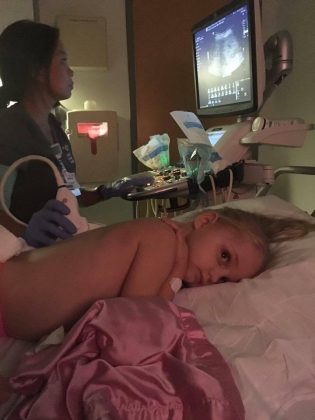
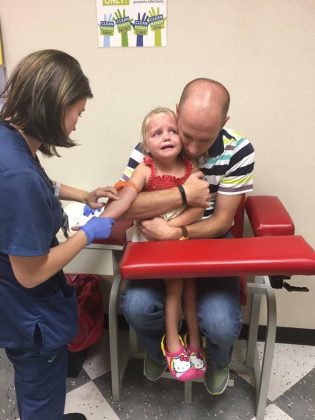
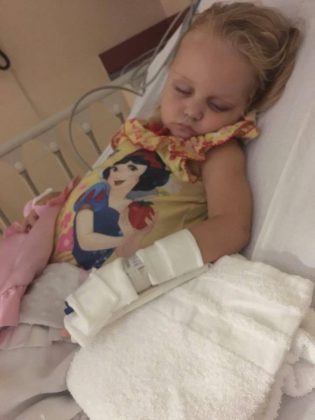
Until recently, Lillian’s kidney function had remained stable. She had undergone lab work in May, and when they reran the labs in August, her kidney function had declined precipitously. “We were stunned, heart broken,” Jamie said. “We sat in utter disbelief as her nephrologist, who has literally been there since day one, told us that it was time, we were being referred to Gainesville and prepping for transplant. Part of me still hasn’t come to terms with it. This is my baby, not now!”
This month, Lillian spent an entire day getting tests — ultrasounds, MRIs, X-rays, lab work — and they also met with her transplant team, discussed the transplant process and how to find a live donor, and what the transplant timeline will be. “Lillian’s kidneys are full of sticky cysts and are approximately two to four centimeters larger than a full-grown adult kidney,” she said. “Her transplant team will meet the first week of December to review her case. Lillian’s surgery will be approximately three to six hours, and she will remain in the hospital for one to two weeks, spending at least the first 48 hours in ICU. We will see her team twice a week in Gainesville for the first six weeks, then once a week for six weeks, and then monthly for at least a year. She will remain on anti-rejection medications the rest of her life. Kidney donation generally lasts 10-15 years, so she will have multiple operations in her lifetime.”
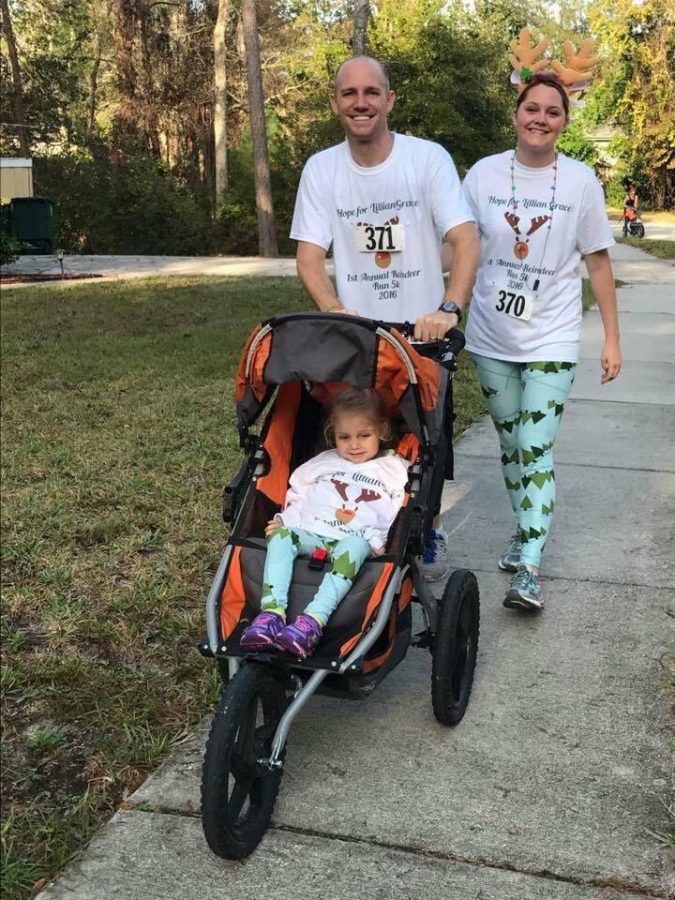
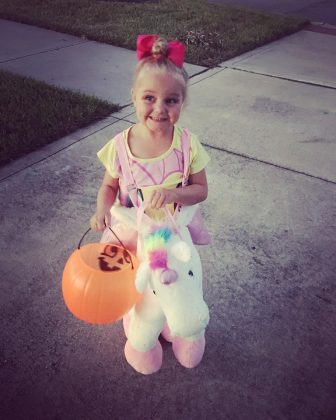
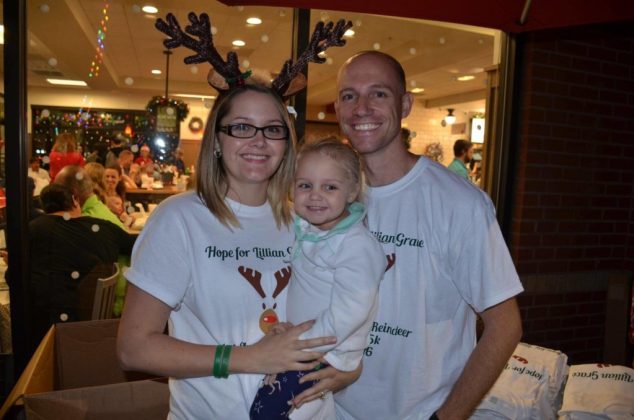
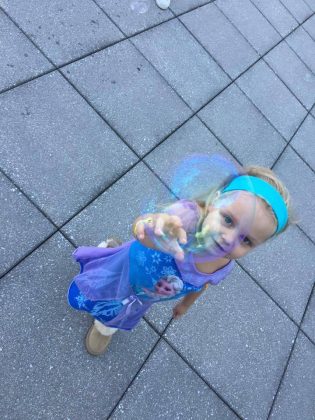
While Lillian does not need to begin dialysis yet, doctors believe she will go active on the regional donation list next month. “We have no doubt we are making the right decision; however, that doesn’t take away the fear,” Jamie said. “This is our baby. We are all scared and protective of what the future holds.”
Naturally, people have wanted to help — and two friends came forward last year to organize the first ever Hope For Lillian Grace Reindeer Run. “My friend Megan basically texted me and told me she was setting this up, and we were doing this!” she said. “I think by October, Megan had helped us set up our Florida 501c3, and had registration open for a 5K held in her very own neighborhood. Our friends were determined to help, and they did in a BIG way!” They had expected around 50 people to show up, but over 150 registered instead. So this year, they’ve partnered with 1st Place Sports to help handle logistics of the run, and to help it grow. And this 5K helps the family immensely.
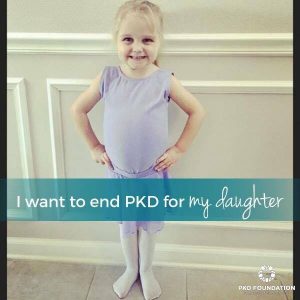
“Lillian’s monthly care costs us approximately $1,000 out of pocket,” Jamie said. “A kidney transplant costs approximately $143,000, with most insurances negotiating it down to approximately $35,000. Her surgery will take place in Gainesville, just over 90 minutes away from our home. And insurance doesn’t provide accommodations unless you are more than two hours away from the hospital. Money raised from the 5K and other fundraisers go straight to our Hope for Lillian Grace 501c3 account. These funds help us pay for her care, her prescriptions, her labs, her surgeries, her ER visits… these funds are STRICTLY used for her care and her care only. And every little bit helps and means more to us than words will ever express.”
But the run will not just help Lillian — it will help bring awareness to the community about ARPKD. “We had never heard of PKD, or ARPKD until November 6, 2011. Now it has taken over our lives,” Jamie said. Joe and Jamie have since been through genetic testing, and found out they are both carriers of the gene, so there is a 25% chance that every child they may have in the future will also have it. “This disease is ugly, and it’s as terrifying as the images show on Google,” Jamie admitted. “However, these kids are amazing. These kids born with ARPKD are beating odds by the minute. They are changing lives, giving hope, fighting harder than most of us will ever have to.” And she wants people to hold on to the hope that Lillian has given them. “Just because science says something should happen, doesn’t mean it will,” she said. “Science told me my baby had a very ‘slim’ chance of surviving… yet here we are today, with one amazing 4-year-old daughter who has more spunk than you can imagine! ARPKD is terrifying, and our journey, Lil’s journey, has been extremely difficult — but I wouldn’t change her or our story for the world.”
For more information on Lillian and the Ball family, you can visit the Hope for Lillian Grace website. For more information or to register for the Second Annual Hope for Lillian Grace Reindeer Run 5K held Saturday, December 9 at 9 a.m. with a 1-mile Fun Run at 8:30 a.m., visit the 1st Place Sports website.

















I’m Lilly’s Papa, and she’s my little Humming Bird. I love her, her parents are amazing, and this article is a wonderful addition to her story. Thank you so much for sharing it!